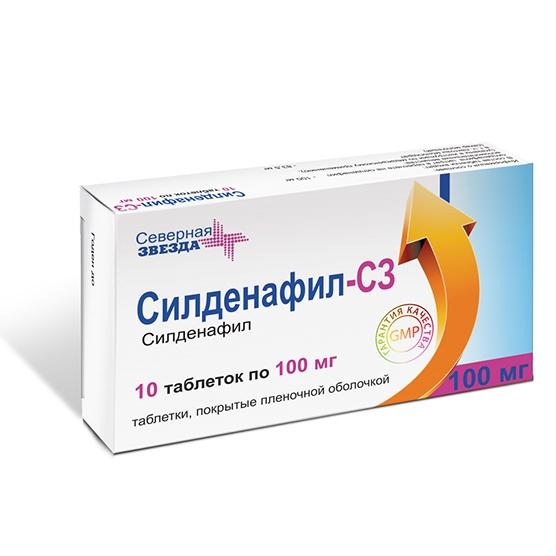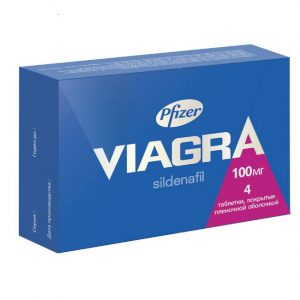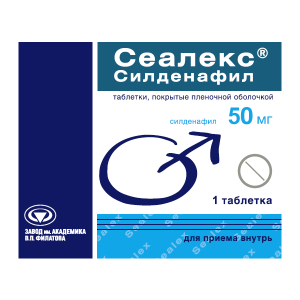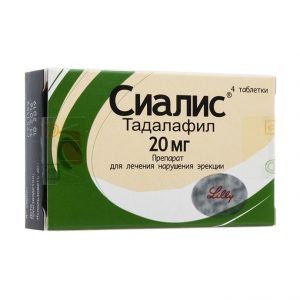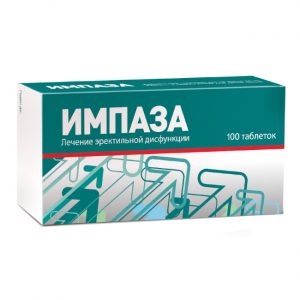Description
Latin name
Sildenafilum
Release form
Blue film coated tablets, round, biconvex. Pills on a fracture of white or almost white.
Packing
In a package of 10 tablets.
Indications
Treatment of erectile dysfunction characterized by an inability to achieve or maintain an erection of the penis sufficient for satisfactory intercourse. Sildenafil is effective only with sexual stimulation.
Contraindications
hypersensitivity to sildenafil or any other component of the
preparation use in patients receiving nitric oxide donors, organic nitrates or nitrites in any form continuously or intermittently, since sildenafil enhances the hypotensive effect of nitrates (see “Interaction”) and the effectiveness of Sildenafil when used together with other treatments for erectile dysfunction has not been studied, therefore, the use of such combinations is not recommended I (see “Special Instructions”)
is not recommended the simultaneous use of sildenafil with ritonavir
according to the registered indication Sildenafil is not intended for use in women
lactase deficiency, lactose intolerance, glucose-galactose malabsorption
according to the registered indication, the drug Sildenafil is not intended for use in children under 18 years of age.
Precautions: anatomical deformation of the penis (angulation, cavernous fibrosis or Peyronie s disease) (see Special Instructions ) diseases predisposing to the development of priapism (sickle cell anemia, multiple myeloma, leukemia, thrombocythemia – see Special instructions ) diseases accompanied by bleeding exacerbation of peptic ulcer of the stomach and duodenum hereditary retinitis pigmentosa (see “Special Instructions”) heart failure, unstable angina, last 6 months nfarkt infarction, stroke or life-threatening arrhythmia, hypertension (blood pressure> 170/100 mmHg ) or hypotension (HELL
Use during pregnancy and lactation
The drug is not intended for use in women.
Composition
active substance: sildenafil citrate in terms of sildenafil – 100 mg excipients (core): microcrystalline cellulose – 83.5 mg lactose monohydrate (milk sugar) – 83.5 mg croscarmellose sodium (primrose) – 15.0 mg povidone (polyvinylpyrrolidone medium molecular weight) – 15.0 mg magnesium stearate – 3.0 mg excipients (shell): Opadry II (polyvinyl alcohol, partially hydrolyzed – 3, 6 mg of titanium dioxide E 171 – 2.061 mg macrogol (polyethylene glycol 3350) – 1.818 mg talc – 1.332 mg brilliant blue aluminum varnish – 0.1728 mg iron oxide (II) yellow E 172 – 0.0153 mg iron oxide ( II) black E 172 – 0.0009 mg).
Dosage and administration
Inside.
The recommended dose for most adult patients is 50 mg approximately 1 hour before sexual activity. Given the effectiveness and tolerability, the dose can be increased to 100 mg or reduced to 25 mg. The maximum recommended dose is 100 mg. The maximum recommended frequency of use is once a day.
Renal dysfunction
In case of mild to moderate degree of renal failure (KK 30-80 ml / min) dose adjustment is not required, in severe renal failure (KK <30 ml / min) - the dose of sildenafil should be reduced to 25 mg. Impaired liver function Since the excretion of sildenafil is impaired in patients with liver damage (in particular, with cirrhosis), the dose of Sildenafil should be reduced to 25 mg. Combined use with other medicines When combined with ritonavir, the maximum single dose of Sildenafil should not exceed 25 mg, and the frequency of use should be 1 time per 48 hours (see the section “Interaction with other medicines”). When combined with cytochrome CYPZA4 isoenzyme inhibitors (erythromycin, saquinavir, ketoconazole, itraconazole), the initial dose of Sildenafil should be 25 mg (see section Interaction with other drugs ). To minimize the risk of developing postural hypotension in patients taking? -Adrenergic blocking agents, Sildenafil should be started only after hemodynamic stabilization is achieved in these patients. The feasibility of lowering the initial dose of sildenafil should also be considered (see sections “Special Instructions” and “Interaction with Other Medicines”). Elderly patients Dose adjustment of Sildenafil is not required Drug Interaction Effect of Other Drugs on the Pharmacokinetics of Sildenafil Sildenafil metabolism occurs mainly by cytochrome CYP3A4 isoenzymes (main pathway), CYP2C9, so inhibitors of these clifers are increased There was a decrease in the clearance of sildenafil with concomitant use of cytochrome CYP3A4 isoenzyme inhibitors (ketoconazole, erythromycin, cimetidine). Cimetidine (800 mg), a non-specific cytochrome CYP3A4 isoenzyme inhibitor, when co-administered with sildenafil (50 mg) causes a 56% increase in plasma sildenafil concentration. Single administration of 100 mg of sildenafil with erythromycin (500 mg / day 2 times a day for 5 days), a specific cytochrome CYP3A4 isoenzyme inhibitor, on the background of achieving a constant erythromycin concentration in the blood, results in an increase in sildenafil AUC of 182%. When co-administered with sildenafil (100 mg once) and saquinavir (1200 mg / day 3 times daily), an HIV protease inhibitor and CYP3A4 cytochrome isoenzyme, sildenafil AUC increased by 140% on the background of achieving saquinavir Cmax aild, aUC increased by 210%. Sildenafil has no effect on the pharmacokinetics of saquinavir. More potent cytochrome isoenzyme inhibitors of CYP3A4, such as ketoconazole and itraconazole, may also cause more severe changes in the pharmacokinetics of sildenafil. Concomitant use of sildenafil (100 mg once) and ritonavir (500 mg twice daily), an HIV protease inhibitor and a potent cytochrome P450 inhibitor, on the background of achieving a constant concentration of ritonavir in the blood leads to an increase in Cmax of 300% of sildenafil times), and the AUC is 1000% (11 times). After 24 hours, the concentration of sildenafil in the blood plasma is about 200 ng / ml (after single use of one sildenafil – 5 ng / ml), which is consistent with the information on the pronounced effect of ritonavir on the pharmacokinetics of various cytochrome P450 substrates. Sildenafil has no effect on the pharmacokinetics of ritonavir. The combined use of sildenafil with ritonavir is not recommended. If sildenafil is taken at recommended doses by patients, receiving simultaneously strong inhibitors of the cytochrome isoenzyme CYP3A4, the Cmax of free sildenafil does not exceed 200 nm, and the drug is well tolerated. Single administration of an antacid (magnesium hydroxide / aluminum hydroxide) does not affect the bioavailability of sildenafil. CYP2C9 cytochrome isoenzyme inhibitors (tolbutamide, warfarin), CYP2D6 cytochrome isoenzyme (selective serotonin reuptake inhibitors, tricyclic antidepressants), thiazide and thiazide-like diuretics, inhibitors Azithromycin (500 mg / day for 3 days) had no effect on AUC, Cmax Tmax, excretion rate constant, and T1 / 2 of sildenafil or its major circulating metabolite. Effects of sildenafil on other drugs Sildenafil is a weak inhibitor of cytochrome P450 -1A2, 2C9, 2C19, 2D6, 2E1 and ZA4 isoenzymes (IR50> 150 μmol). When taking sildenafil at the recommended doses, its Cmax is about 1 μmol, so it is unlikely that sildenafil can affect the clearance of substrates of these isoenzymes.
Sildenafil enhances the antihypertensive effect of nitrates, both with prolonged use and with acute administration. In this regard, the use of sildenafil in combination with nitrates or nitric oxide donors is contraindicated.
Doxazosin (4 mg and 8 mg) blocker and sildenafil (25 mg, co-administered blocker) 50 mg and 100 mg) in patients with benign prostatic hyperplasia with stable hemodynamics, the mean additional reduction in systolic / diastolic blood pressure in the supine position was 7/7 mm Hg. 9/5 mm Hg and 8/4 mm Hg, respectively, and in the standing position – 6/6 mm Hg, 11/4 mm Hg and 4/5 mm Hg, respectively. Rare cases have been reported in such patients of symptomatic postural hypotension, manifested as dizziness (without fainting). In some sensitive patients receiving β-blockers, concomitant administration of sildenafil may lead to symptomatic hypotension.
No significant interaction with tolbutamide (250 mg) or warfarium (40 mg) metabolised by the CYP2C9 cytochrome isoenzyme has been identified.
Sildenafil (100 mg) had no effect on the pharmacokinetics of HIV protease inhibitors, saquinavir and ritonavir, which are substrates of the CYP3A4 cytochrome isoenzyme, at constant levels in the blood. Sildenafil (50 mg) did not cause an additional increase in bleeding time with acetylsalicylic acid (150 mg). Sildenafil (50 mg) does not potentiate the antihypertensive effect of alcohol in healthy volunteers with an average blood alcohol concentration of 0.08% (80 mg / dL).
No signs of interaction of sildenafil (100 mg) with amlodipine were found in patients with hypertension. The average additional reduction in blood pressure in the supine position is 8 mm Hg. (systolic) and 7 mm Hg (diastolic).
The use of sildenafil in combination with antihypertensive agents does not lead to additional side effects.
Overdose
With single administration of Sildenafil up to 800 mg, the undesirable effects were comparable to those seen at lower doses, but were more common.
Treatment is symptomatic. Hemodialysis does not accelerate the clearance of sildenafil, since the latter actively binds to plasma proteins and is not excreted by the kidneys.
Storage conditions
In a dry, dark place at a temperature of no higher than 25 ° C. Keep out of the reach of children.
The Expiration of
is 3 years.
Deystvuyuschee substances
Sildenafil
Terms of delivery from pharmacies
Prescription
dosage form
dosage form
tablets
Northern Star, Russia
